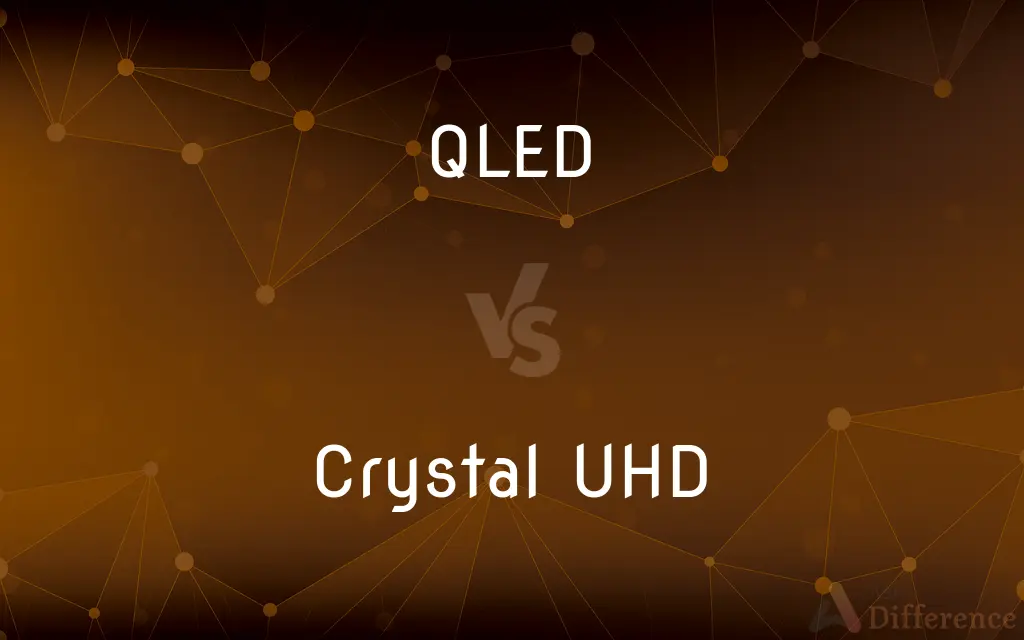QLED vs. Crystal UHD — What's the Difference?
By Tayyaba Rehman & Urooj Arif — Published on February 26, 2024
QLED technology, using quantum dots, enhances color and brightness, ideal for premium viewing experiences. Crystal UHD, focusing on cost-effectiveness, offers improved clarity and color over standard UHD without the quantum dot layer.

Difference Between QLED and Crystal UHD
Table of Contents
ADVERTISEMENT
Key Differences
QLED (Quantum Dot LED) TVs utilize quantum dots to amplify color and brightness, providing a superior range of vivid colors and deeper contrast. This technology is often found in higher-end TVs, aimed at users seeking the best visual experience. Crystal UHD, on the other hand, refers to a marketing term used by Samsung to describe their 4K TVs that don't use quantum dots but still improve upon traditional UHD (Ultra High Definition) through software enhancements and a Crystal Processor for better clarity and color accuracy.
The primary difference lies in the technology each uses to enhance picture quality. QLED's quantum dot technology allows it to achieve higher peak brightness and a wider color spectrum, making it better suited for brightly lit rooms and providing a more immersive HDR (High Dynamic Range) experience. Crystal UHD TVs, while still offering a significant upgrade from standard HD TVs, might not reach the same levels of brightness and color volume as QLEDs.
In terms of price, QLED TVs typically command a higher price point due to their advanced technology and enhanced viewing experience. Crystal UHD TVs are positioned as a more budget-friendly option, offering consumers a middle ground between high-end QLEDs and standard UHDs.
Both QLED and Crystal UHD TVs support 4K resolution, but the enhanced color and contrast capabilities of QLED make it a preferred choice for those prioritizing picture quality. However, Crystal UHD TVs still represent a significant improvement over standard 1080p HD TVs, making them a solid choice for those looking to step into 4K without breaking the bank.
The choice between QLED and Crystal UHD should be based on the user's budget, viewing preferences, and the importance of having the most advanced color and brightness technologies available.
ADVERTISEMENT
Comparison Chart
Technology
Quantum Dot LED
Advanced UHD with Crystal Processor
Picture Quality
Higher peak brightness, wider color gamut
Improved clarity and color accuracy
Price
Higher due to advanced technology
More budget-friendly
Best For
Bright rooms, HDR content
Consumers seeking value in 4K experience
Color & Brightness
Enhanced by quantum dots
Enhanced through processing, no quantum dots
Compare with Definitions
QLED
More expensive due to advanced technology.
I invested in a QLED TV for its unmatched picture quality.
Crystal UHD
A budget-friendly 4K option.
I chose a Crystal UHD TV to upgrade to 4K without spending too much.
QLED
Emphasizes vibrant, lifelike colors.
The QLED technology made the ocean scenes look astonishingly real.
Crystal UHD
Samsung's term for their enhanced 4K UHD TVs without quantum dots.
My Crystal UHD TV offers great clarity and color at a reasonable price.
QLED
Ideal for varied lighting conditions.
The QLED screen remains clear and vivid even under direct sunlight.
Crystal UHD
Delivers improved color accuracy.
The colors on my Crystal UHD TV are more accurate than my old HD TV.
QLED
A TV technology that uses quantum dots to enhance brightness and color.
The QLED TV displayed vibrant colors even in a brightly lit room.
Crystal UHD
Suitable for everyday viewing and gaming.
The Crystal UHD's performance is impressive, especially for gaming.
QLED
Known for superior picture quality in HDR content.
Watching movies on a QLED TV brings out incredible detail in dark and bright scenes.
Crystal UHD
Focuses on upscaling content for better detail.
The Crystal Processor in my TV makes even old movies look sharper.
Common Curiosities
What distinguishes Crystal UHD from standard UHD?
Crystal UHD refers to Samsung's 4K TVs that use a Crystal Processor for better clarity and color accuracy, without quantum dots.
Why choose Crystal UHD?
Crystal UHD is a cost-effective choice for those upgrading to 4K, offering improved clarity and color over standard UHD.
Can both QLED and Crystal UHD display 4K content?
Yes, both technologies support 4K resolution, though QLED provides a more enhanced viewing experience.
Which is better for bright rooms, QLED or Crystal UHD?
QLED, with its higher peak brightness, is better suited for brightly lit environments.
Do I need a special device to watch content on a QLED or Crystal UHD TV?
No special device is needed, but a 4K-compatible streaming device or player can enhance the viewing experience.
What is QLED technology?
QLED uses quantum dots to enhance the brightness and color spectrum of the TV display.
Is QLED better than Crystal UHD?
QLED generally offers superior brightness and color volume, making it better for high-quality HDR content.
Are QLED TVs more expensive than Crystal UHD TVs?
Yes, QLED TVs are typically more expensive due to their advanced quantum dot technology.
What is the main advantage of QLED over Crystal UHD?
The main advantage of QLED is its ability to produce more vivid and brighter images thanks to quantum dot technology.
Is Crystal UHD good for gaming?
Crystal UHD is suitable for gaming, offering clear and vibrant visuals at a more accessible price point.
Can QLED TVs display deep blacks like OLED?
While QLED TVs offer excellent contrast, OLED TVs are generally better at displaying deep blacks.
Do both technologies support HDR content?
Yes, both QLED and Crystal UHD support HDR content, but QLED offers a more immersive HDR experience.
How does the Crystal Processor improve UHD TVs?
The Crystal Processor upscales content to near-4K quality, improving clarity and color accuracy.
Which technology is newer, QLED or Crystal UHD?
QLED and Crystal UHD are both modern technologies, but QLED represents a higher end of Samsung's TV technology spectrum.
Are Crystal UHD TVs energy efficient?
Crystal UHD TVs are designed to be energy efficient, though efficiency can vary by model and settings.
Share Your Discovery

Previous Comparison
Punjabi vs. Indian
Next Comparison
Guardianship vs. CustodyAuthor Spotlight
Written by
Tayyaba RehmanTayyaba Rehman is a distinguished writer, currently serving as a primary contributor to askdifference.com. As a researcher in semantics and etymology, Tayyaba's passion for the complexity of languages and their distinctions has found a perfect home on the platform. Tayyaba delves into the intricacies of language, distinguishing between commonly confused words and phrases, thereby providing clarity for readers worldwide.
Co-written by
Urooj ArifUrooj is a skilled content writer at Ask Difference, known for her exceptional ability to simplify complex topics into engaging and informative content. With a passion for research and a flair for clear, concise writing, she consistently delivers articles that resonate with our diverse audience.













































